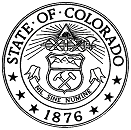![]() The information on this page is archived and provided for reference purposes only. It may be outdated or no longer maintained.
The information on this page is archived and provided for reference purposes only. It may be outdated or no longer maintained.
Colorado Secretary of State Takes Action to Increase Cyber Security, Announces Initiative to Remove QR Codes from Ballots
Denver, September 16, 2019 – Colorado Secretary of State Jena Griswold announced that Colorado will stop using ballots with QR codes. The removal of QR codes will increase the security of vote tabulation and ensure voters can accurately verify that their ballots are correctly marked. With foreign countries actively trying to exploit voting vulnerabilities, this is a first-in-the nation added security measure.
"I am proud that Colorado continues to lead the nation in election cybersecurity," said Secretary of State Jena Griswold. "Voters should have the utmost confidence that their vote will count. Removing QR codes from ballots will enable voters to see for themselves that their ballots are correct and helps guard against cyber meddling."
Colorado will be the first state to require voting systems to tabulate all ballots using only human-verifiable information and not QR codes. Because of this initiative, an enhanced system is being developed and it will be tested and certified before it is deployed starting after the 2020 election. Once fully implemented, all ballots voted in Colorado will be tabulated using the marked ovals on the ballot rather than information from a QR code.
The U.S. intelligence community has concluded that Russian operatives executed a campaign to influence the outcome of the 2016 Presidential Election, and warns that efforts will continue in the future. Cybersecurity experts and election integrity advocates have raised questions about the security and verifiability of paper ballots containing a QR code. Secretary Griswold is proactively leading the nation to reduce future vulnerabilities.
"We live in a constantly changing threat environment. Hostile actors will continue their efforts to discover vulnerabilities in the attempt to undermine confidence in our elections. We must continually assess all election systems to identify areas that should be improved. Our adversaries are not standing still, and neither can we," continued Secretary Griswold.
Currently, when a Coloradan votes at a polling location, they may use a ballot marking device that prints a paper ballot that displays both the voter's choices and a QR code embedded with the voter's choices. Although voters can see their vote choices, they cannot verify that the QR code is correct. These ballots are tabulated by machines that decode the votes contained in the QR code. QR codes could be among the next target of an attack and are potentially subject to manipulation. Colorado will be the first state to require ballots from ballot marking devices to be tabulated using only human-verifiable information and not QR codes.
Unlike Colorado, many states do not have safeguards built in to catch manipulations. Colorado is the only state to have successfully conducted a statewide risk-limiting audit, in which bipartisan teams count randomly selected ballots and compare those results to the machine tallies of the same ballots. This statistically-proven method allows Coloradans to have confidence in our state's election outcomes and guards against QR code manipulation.
There is no evidence that any of Colorado's voting systems have been targeted or attacked by malicious actors. By design, in Colorado the computers and devices that mark and count ballots and votes are completely independent from online systems. Colorado prohibits voting system components from being directly or indirectly connected to the internet, and imposes multiple layers of security to ensure that threats are not spread to a tabulation system by other means.
Secretary Griswold's decision to move away from QR codes furthers Colorado's status as the safest state in the nation to cast a ballot.




 Menu
Menu  Search
Search 
